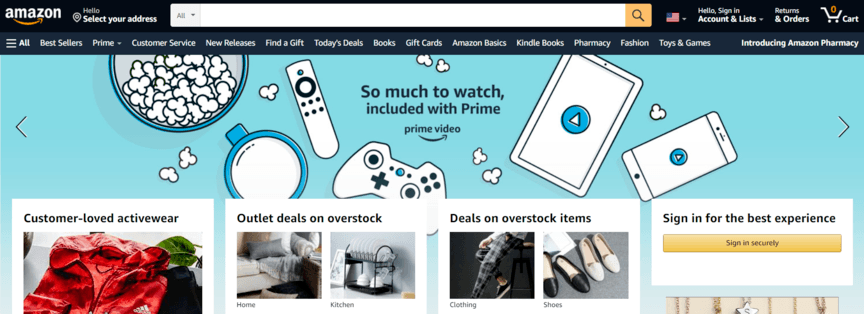Is Selling on Amazon Worth It for SMBs? Here’s What You Need to Know
Yes, Taylor knows that Amazon is the place to shop online, but that doesn’t make his company’s decision easy. As a small-to-midsized business (SMB), they want to know whether it is worth selling on Amazon before opening a store — not after.
Which leads to the question: Is selling on Amazon worth it for SMBs?
Well, it depends. In most cases, SMBs like yours will see returns from becoming an Amazon seller because you open a new avenue (on the world’s biggest ecommerce marketplace) for driving revenue. Of course, your success will depend on your brand, product, and Amazon marketing strategy.
If you’re like Taylor and looking to learn more about the pros and cons of selling on Amazon, keep reading for a complete breakdown. Or, if you’d like to ask a professional, “Should I sell on Amazon?” contact us online or give us a ring at 888-601-5359 to speak with an experienced strategist for SMBs.
Table of Contents
- Is it worth selling on Amazon as an SMB?
- The pros and cons of selling on Amazon as an SMB
- Should I sell on Amazon? 3 advantages to consider
- Should I sell on Amazon? 3 disadvantages to consider
Is it worth selling on Amazon as an SMB?
Is it worth selling on Amazon as an SMB? Well, it depends on your:
- Product: Your product is the foundation of your success, both on and off Amazon. As an SMB, you’ve already established the value of your product. However, success on Amazon requires conveying your product’s usefulness fast so you can beat out the competition — including Amazon.
- Pricing: Amazon attracts a tremendous number of consumers — and competing brands. That’s why many SMBs that sell on Amazon need to adapt and monitor their prices continuously. If you don’t, you will struggle to earn sales because your listings will rank lower in search results.
- Brand: When you have an established brand, you gain an advantage in the Amazon marketplace. Branded searches, for instance, can bring you instant sales. You can also benefit from the Amazon Brand Registry, which protects against knock-off versions of your products.
- Marketing strategy: If you’re looking to make Amazon your next revenue driver, a diverse marketing strategy is a must. Most SMBs, for instance, will invest in search engine optimization (SEO) and pay-per-click (PPC) ads to make it as easy as possible for people to find and buy their products.
In most cases, some of these factors will be stronger or weaker than others.
For example, you may have a great product at a fantastic price but a weak brand and marketing strategy. That doesn’t mean you shouldn’t sell on Amazon, but it does signal you’ll want to invest some time into improving your marketing plan — or hiring an Amazon marketing agency to do it for you.
Once you determine if it’s worth selling on Amazon (based on the above factors), you can move on to learning about the pros and cons of selling on Amazon. These advantages and disadvantages will help you make your final decision about opening an Amazon Store.
Increase your SMB's Amazon sales. See how with a free proposal.
The pros and cons of selling on Amazon as an SMB
For a quick summary of the pros and cons of selling on Amazon as an SMB, check out this table:
| Pros of selling on Amazon | Cons of selling on Amazon |
| Access Amazon’s massive audience | Compete with thousands of other sellers |
| Expand avenues for generating revenue | Adapt to Amazon’s evolving marketplace |
| Requires a low-risk investment | Give customer ownership to Amazon |
You can also keep reading for a complete breakdown of these positives and negatives!
Should I sell on Amazon? 3 advantages to consider
If you have a great product, marketing strategy, and brand like Taylor’s company, but are still wondering, “Should I sell on Amazon?” then you’ll want to review these three advantages of selling on Amazon as an established SMB:
1. Access Amazon’s massive audience
Overnight, your business can gain access to an audience of more than 300 million.
While these 300+ million users won’t all become your customers, you can bet your target audience is among them. That’s why many SMBs, especially those looking to sell online for the first time, turn to Amazon.
It provides a quick way to start reaching your audience and selling your product. Plus, with the advanced targeting options available through Amazon ads, you can launch hyper-targeted campaigns that drive revenue year-round.
2. Expand avenues for generating revenue
With the Internet, businesses like yours can drive revenue through multiple channels, including:
- Search
- Social media
- Paid ads
- Online marketplaces
- And more
When you join the Amazon marketplace, you create a new revenue driver for your SMB.

Multiple revenue streams help protect your business against market changes. If Facebook advertising costs increased, for instance, your company wouldn’t feel the same pressure as businesses that put all their ad spend into Facebook and depend on the network for sales.
Of course, when expanding your online presence and revenue sources, it’s vital to have the necessary time and resources to manage these new channels. If you don’t have the time to operate, market, and advertise your Amazon Store, for example, you’ll often see lower returns.
That’s why some SMBs outsource specific tasks, like setting up their store or optimizing their listings.
3. Requires a low-risk investment
From the perspective of an SMB, opening an Amazon Store is a low-risk investment.

That’s because established SMBs meet the basic requirements for successfully selling on Amazon, like by having a great product and proven brand. In comparison, start-ups face greater challenges because they have an unknown brand and product.
Companies can also experiment with selling on Amazon.
For example, you can upload some of your best-selling products to the marketplace versus investing the time to add your entire catalog. Based on those products’ performance and their marketing campaigns, you can decide whether to invest further in Amazon.
This flexibility allows your business to make a more informed decision about selling on Amazon.
Should I sell on Amazon? 3 disadvantages to consider
When it comes to answering the question, “Should I sell on Amazon?” it’s important to address the drawbacks of selling on Amazon first. The three most notable disadvantages to selling on Amazon as an SMB include:
1. Compete with thousands of other sellers
Businesses that sign-up to sell on Amazon can expect competition.
The ecommerce marketplace features more than one million other SMBs. They make up more than 58% of sales on Amazon. While you won’t compete with these sellers one-on-one, you will likely see some familiar names on the platform.
That’s why your company needs a competitive:
- Product
- Price
- Brand
- Marketing strategy
With a competitive marketing strategy, like Amazon SEO, you can improve your rankings in Amazon search results. Rank higher, like on page one, and you can capture more traffic and sales than your competitors.
If one of your competitors is Amazon, expect a bigger challenge in selling on Amazon.

Since no one sells on Amazon better than Amazon, SMBs directly competing with the ecommerce giant will need to deliver an A+ product, service, and customer experience. If not, Amazon will outsell your business every time because of its aggressive price matching and enhanced visibility in search results.
2. Adapt to Amazon’s evolving marketplace
Amazon is an online marketplace, and your SMB becomes one of its sellers when you sign up.
As one of the company’s sellers, you must follow Amazon’s rules for its marketplace and adapt to changes. For instance, updates to Amazon’s ranking algorithm or advertising program may require rethinking your Amazon SEO or PPC strategy.
SMBs also need to pay attention to changes in Amazon’s:
- Seller fees
- Customer communication rules
- Program requirements, like for Amazon Prime or Subscribe & Save
This disadvantage of selling on Amazon as an SMB is one reason why it’s so important to have multiple channels for driving revenue. Besides Amazon, for instance, your business could also rely on your website to generate sales.
3. Give customer ownership to Amazon
One of the biggest reasons people answer “No” to “Is selling on Amazon worth it for SMBs?” is because of customer ownership. Instead of “owning” the customer relationship, which would allow you to interact and engage shoppers beyond order fulfillment messages, you “lease” clients from Amazon.
That’s because, from Amazon’s perspective, everyone who shops on the site is an Amazon customer.
In exchange for selling on the world’s largest ecommerce website and accessing an audience of more than 300 million users, you give up the ability to nurture these shoppers into repeat customers that become brand ambassadors.

From a marketing perspective, selling on Amazon as an SMB limits your marketing options.
In most cases, you’ll find your marketing options restricted to Amazon. For example, you’ll likely focus on SEO and PPC, which are fantastic strategies, to grow your sales on the platform. However, you won’t have access to one of the best marketing tactics for driving revenue — email marketing.
Again, this con to selling on Amazon is why many SMBs take an omnichannel approach to making revenue online. Instead of solely relying on Amazon, many will have an Amazon Store and a dedicated ecommerce website for selling their products.
Is it hard to sell on Amazon? Not when you have a great product and marketing plan.
When it comes to becoming a seller on Amazon, it’s great to ask questions like:
- Is it worth selling on Amazon?
- Is it hard to sell on Amazon?
- What are the pros and cons of selling on Amazon?
Answers to these questions help your SMB make an educated decision about opening an Amazon Store. In most cases, companies with an established brand, fantastic product, competitive pricing, and a solid marketing plan will get the results they want from Amazon, like more sales and higher returns.
So, if you’re ready to sell on Amazon, but need some help, give one of our strategists a call. Just contact us online or give us a ring at 888-601-5359 to learn how our Amazon Store, Amazon SEO, and Amazon PPC services can support your business and revenue goals.